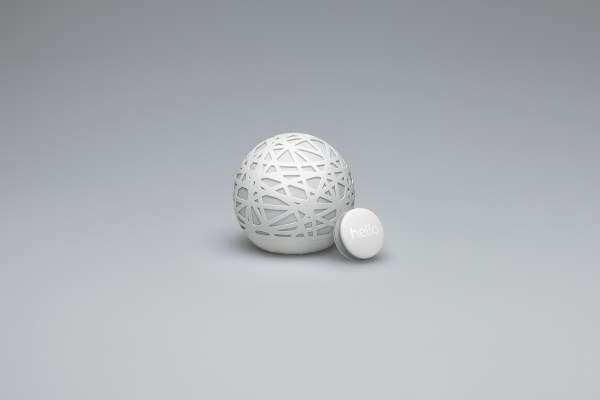Sense, a small sleep tracker that sits by your bed that looks to help improve sleep behavior, will now be for sale in international markets as the company gears up for the holiday shopping season.
Hello, the maker of Sense, said it would start selling the tracker in a batch of new countries including Australia, Ireland and many other European countries. It’ll also be for sale in the UK thanks to a partner with Amazon UK. The company already sold Sense through Amazon as of November last year. Here’s the full list of countries: Australia, Belgium, Canada, Finland, France, Germany, Ireland, Italy, Netherlands, Spain, Sweden, and United Kingdom.
Sense consists of two products: a small nest-like ball that sits on a nightstand or somewhere in a bedroom, and a small electronic device that goes inside a pillowcase. The combination of the two helps track a number of variables in the room — like noise level, air particulates and lighting — and as well as how someone moves around when they sleep. The result is a service that helps users determine the best way to alter their environment and their sleeping habits in order to have higher quality sleep.
The move will come just in time for the holiday shopping season — which, for many device companies is a critical moment to ship as many units as possible. A strong retail season can carry a company through slower quarters and help them generate enough cash to continue driving growth at the company. Sense has been available for purchase in the U.S. for about a year.
“We’re now getting to the point where we’re starting the initial process, getting prepared for one for Christmas — but also we have a lot of interest from big box retailers, not just in the U.S. but also international,” CEO James Proud said. “We’ve got some relationships started, we need someone who understands that, to make sure we do that right.”
In order to kick that into gear more quickly, Hello has also hired a new head of sales. Coming from Nest, Kyrk Jordan will also be managing the company’s entry into brick and mortar stores — which is a whole other set of problems for a potential hardware company. Shipping units that might not sell can be costly if the products don’t actually sell, and it’s harder to actually gauge demand because there isn’t as much data readily available on how customers are behaving.
“You basically, when you’re doing direct and e-commerce, you reduce the number of possible variables that can go wrong,” he said. “You’re able to tweak messaging very quickly, gauge how things work online, but once you go into stores that becomes a lot harder. That’s a reason we’ve taken it pretty slowly, we really wanted to hone that.”
The big challenge for Hello will be ensuring that it has enough units to sate demand for the product. While Hello is able to sell Sense units online, and through Amazon, it has a whole array of channels to fulfill that’s ever-expanding. From fulfilling Kickstarter orders to getting the sleep trackers into actual stores, it’s a careful balancing act to ensure that potential customers don’t get turned off by waiting too long for a product.
“That’s the chicken and egg problem,” Proud said. “We think we have a pretty good situation, we can actually react very quickly with the production we have in China, and we’ve planned that out accordingly. The hope is always we got that right, but if we’re wrong it’s a high-class problem to try to fix.”
Starting as a Kickstarter project, Sense raised $2.4 million — which included a lot of international interest, Proud said. That served as a testing ground for potential customers, he said, and it turned out to generally be not that complicated to prepare the trackers for international markets. Of the devices the company has shipped, 70% of them were actively in use, Proud said.
As a small piece of hardware with a lot of sensors already built into it, Sense also has the capability to upgrade itself with simple firmware updates. For example, most recently the company released an update that essentially also turned sense into a white noise machine using the device’s built-in speaker. Proud said that around 80% of the company’s users tried out the new feature, and continued to use it for days after.
Hello has raised $40 million total, including a $30 million financing round last year led by Temasek that valued the company between $250 million and $300 million. Hello raised $2.4 million in its Kickstarter campaign prior to launching.
